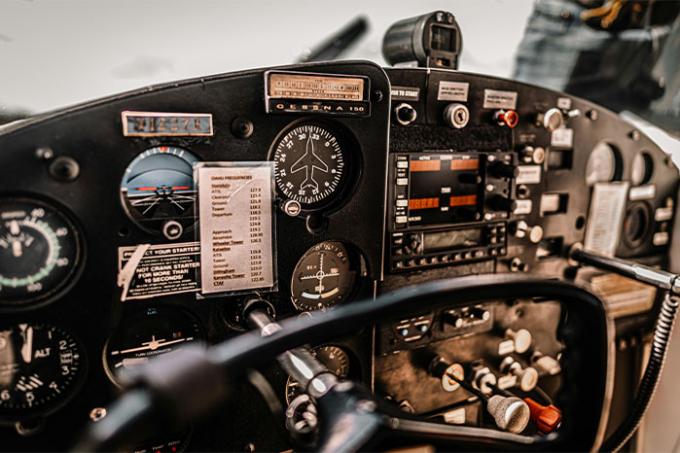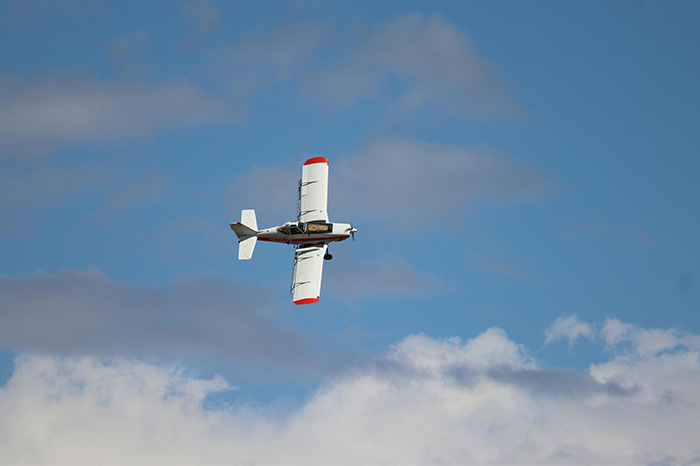
Flight anxiety is that uneasy feeling many pilots experience before taking on the responsibility of flying solo. It’s okay to feel nervous! Whether it's fear of making mistakes or the pressure to fly perfectly, these feelings are natural. With the right preparation and mindset, you'll be able to overcome them and focus on what really matters: flying confidently.
Read More: Why Choose Pilot Training in California? 3 Top Reasons
Flight Anxiety is Normal for All Pilots Here’s what you might feel:
Worrying about the consequences of an error while in control of the aircraft.
Feeling responsible for the safety of both yourself and the aircraft.
Anxiety about handling unexpected situations without an instructor's guidance.
Concerns about changes in weather, system malfunctions, or unfamiliar airspace.
Anxiety triggered by the nature of the flight itself.
Concerns about the aircraft's safety, heights, or lack of control.
If you’re feeling all of this, it’s normal. Even experienced pilots face similar challenges. In fact, seasoned pilots still feel stress when flying in unfamiliar scenarios, such as:
Flying in different weather conditions
Handling complex airspace
Performing advanced maneuvers
Flight anxiety is a natural response to the perceived risks in aviation. It’s a part of managing responsibility and is not a sign of inadequacy. It’s a normal part of the process in aviation!

Prepare Your First Solo Flight (Source Image: Pexels/Lonna)
There a some tips to manage your stress or flight Anxiety before your solo flight:
To ensure a successful first solo flight, it's essential to prepare both mentally and physically, setting yourself up for confidence and control in the cockpit.
Mental Preparation: Start by visualizing your flight going smoothly. Picture yourself handling takeoff, cruising, and landing like a pro. It’s all about setting a positive mindset, which will make the real flight feel much more manageable.
Physical Preparation: Rest up the night before your flight and don’t forget to do some deep breathing exercises to relax. A calm body leads to a calm mind, helping you feel more in control and focused when it’s time to fly.
Once you’re in the air, remember to trust your training. Stick to your procedures and stay present in the moment. Break the flight into smaller steps, focus on takeoff, then climb, and so on. This helps you stay grounded and focused on the task at hand.
Read More: Stress Management for Pilots: Handle Pressure with Confidence
Managing the fear of flying takes time and practice, but with every flight, you’ll gain more confidence. Lean on your training and remember, everyone feels this way at some point. The more you practice, the easier it gets.
Sometimes, it’s helpful to talk to your instructor. They can offer advice, answer your questions, and help you feel more prepared. Getting support from someone with experience can make a huge difference in overcoming anxiety.
Ready to face your first solo flight with a clear mind and a confident heart with 14DAYPILOT? Join the 14DAYPILOT training program today and take to the skies with ease and confidence!
By preparing mentally, physically, and leaning on your training, you’re already one step ahead. Don’t forget: It’s normal to feel nervous, but with the right tools and mindset, you’ve got this!
Let’s work together to help you feel confident, calm, and ready for takeoff. Your solo flight is just around the corner!

Feeling nervous before your first solo flight? You're not alone! It’s completely normal to have a little flight anxiety when facing such an exciting milestone. But the good news is, with the right strategies, you can turn those nerves into confidence. Let’s walk through some simple and effective ways to manage that stress and get you ready to soar!
Flight anxiety is that uneasy feeling many pilots experience before taking on the responsibility of flying solo. It’s okay to feel nervous! Whether it's fear of making mistakes or the pressure to fly perfectly, these feelings are natural. With the right preparation and mindset, you'll be able to overcome them and focus on what really matters: flying confidently.
Read More: Why Choose Pilot Training in California? 3 Top Reasons
Flight Anxiety is Normal for All Pilots Here’s what you might feel:
Worrying about the consequences of an error while in control of the aircraft.
Feeling responsible for the safety of both yourself and the aircraft.
Anxiety about handling unexpected situations without an instructor's guidance.
Concerns about changes in weather, system malfunctions, or unfamiliar airspace.
Anxiety triggered by the nature of the flight itself.
Concerns about the aircraft's safety, heights, or lack of control.
If you’re feeling all of this, it’s normal. Even experienced pilots face similar challenges. In fact, seasoned pilots still feel stress when flying in unfamiliar scenarios, such as:
Flying in different weather conditions
Handling complex airspace
Performing advanced maneuvers
Flight anxiety is a natural response to the perceived risks in aviation. It’s a part of managing responsibility and is not a sign of inadequacy. It’s a normal part of the process in aviation!

Prepare Your First Solo Flight (Source Image: Pexels/Lonna)
There a some tips to manage your stress or flight Anxiety before your solo flight:
To ensure a successful first solo flight, it's essential to prepare both mentally and physically, setting yourself up for confidence and control in the cockpit.
Mental Preparation: Start by visualizing your flight going smoothly. Picture yourself handling takeoff, cruising, and landing like a pro. It’s all about setting a positive mindset, which will make the real flight feel much more manageable.
Physical Preparation: Rest up the night before your flight and don’t forget to do some deep breathing exercises to relax. A calm body leads to a calm mind, helping you feel more in control and focused when it’s time to fly.
Once you’re in the air, remember to trust your training. Stick to your procedures and stay present in the moment. Break the flight into smaller steps, focus on takeoff, then climb, and so on. This helps you stay grounded and focused on the task at hand.
Read More: Stress Management for Pilots: Handle Pressure with Confidence
Managing the fear of flying takes time and practice, but with every flight, you’ll gain more confidence. Lean on your training and remember, everyone feels this way at some point. The more you practice, the easier it gets.
Sometimes, it’s helpful to talk to your instructor. They can offer advice, answer your questions, and help you feel more prepared. Getting support from someone with experience can make a huge difference in overcoming anxiety.
Ready to face your first solo flight with a clear mind and a confident heart with 14DAYPILOT? Join the 14DAYPILOT training program today and take to the skies with ease and confidence!
By preparing mentally, physically, and leaning on your training, you’re already one step ahead. Don’t forget: It’s normal to feel nervous, but with the right tools and mindset, you’ve got this!
Let’s work together to help you feel confident, calm, and ready for takeoff. Your solo flight is just around the corner!
Giorgeo Tarigan is an FAA-certified commercial pilot with expertise in flying both single and multi-engine airplanes. He is also an Advanced Ground Instructor and Instrument Ground Instructor. With experience ferrying airplanes in the US and abroad, Giorgeo is committed to providing excellent training and helping students pass their checkrides with flying colors.
Giorgeo Tarigan is an FAA-certified commercial pilot with expertise in flying both single and multi-engine airplanes. He is also an Advanced Ground Instructor and Instrument Ground Instructor. With experience ferrying airplanes in the US and abroad, Giorgeo is committed to providing excellent training and helping students pass their checkrides with flying colors.